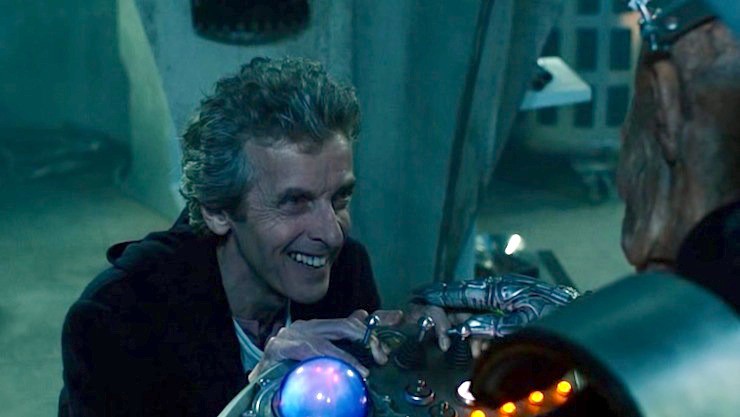The first two-parter of Doctor Who season nine is complete, and many questions were answered: What did the Doctor say to that small boy alone on a battlefield? Whatever happened to Missy and Clara? Why does Davros want to talk to his arch-enemy anyhow?
Let’s take a look at “The Witch’s Familiar.”
Summary
We start with Missy and Clara—who are clearly not dead at all. Missy starts by giving Clara a scenario, where the Doctor is on the run from android assassins, traveling by one of their teleport devices, just like she was in the previous episode. She asks Clara how the Doctor avoids being killed by the assassins, and Clara figures he does it by using the tech from the teleport device to absorb their weapons’ fire and teleport again… and that happens to be exactly how Missy avoided being killed before, and how they’re still alive. Missy asks why the Doctor survives, and Clara says it’s because he always believes he can. Missy asks what is different now, then, with his delivering of the will and such. Clara says that it means the Doctor has given up hope, and they in turn give up hope because he has. With that lesson over, they journey back to the heart of Skaro to find the Doctor.
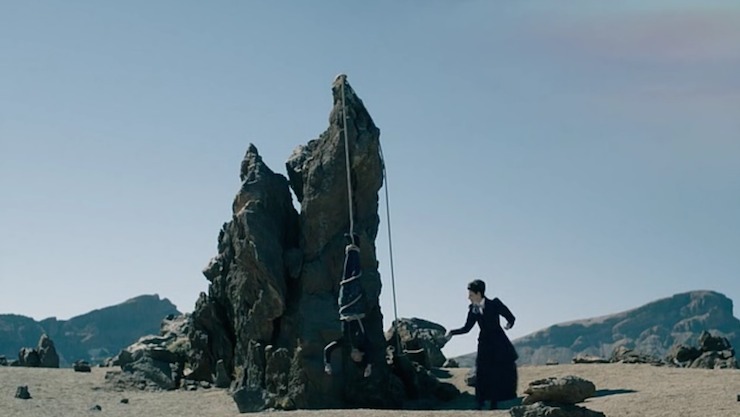
The Doctor steals Davros’ chair for a while, making use of its shielding. He asks the Daleks to return Clara to him, even having seen her murder. Davros has his snaky security guard stop the Doctor and bring him back, insisting that they’ll entrap him yet.
Missy and Clara head into the Dalek sewer, which turns out to be more of a Dalek graveyard, where the useless bodies of Daleks who have lived too long wither away and melt into the walls. Missy insists that they get Clara caught so they can get a Dalek to come down there. One arrives and Missy pierces it, prompting a Dalek stew in the sewer to attack and destroy it. Missy has Clara climb into the Dalek casing and control it; one of the things she finds is that whenever Clara tries to say her own name, it comes out “I am a Dalek,” and when she says I love you, it comes out “Exterminate.” They head aboveground to talk to the Daleks.
In the meantime, the Doctor has a long heart-to-heart with Davros, who is being surprisingly kind. He asks about the Doctor’s “will,” which is apparently a confession that explains why he ran from Gallifrey in the first place. He talks of their never-ending conflict; of the cables in his chamber that he draws life from, connected to every Dalek; and how it’s no longer enough to sustain him. He encourages the Doctor to murder the Daleks through those cables, pointing out how many of each other’s peoples they’re responsible for killing. The Doctor tells Davros that Gallifrey is actually out there somewhere, and Davros is glad, glad to know that the Doctor still has his people. He asks to look on the Doctor with his real eyes, and they have a moment together, joking around. He tells the Doctor that all he really wants is to see the sunrise one more time before he dies. By the time they get to that sunrise, Davros cannot open his eyes and seems near the end, so the Doctor offers up some regeneration energy…
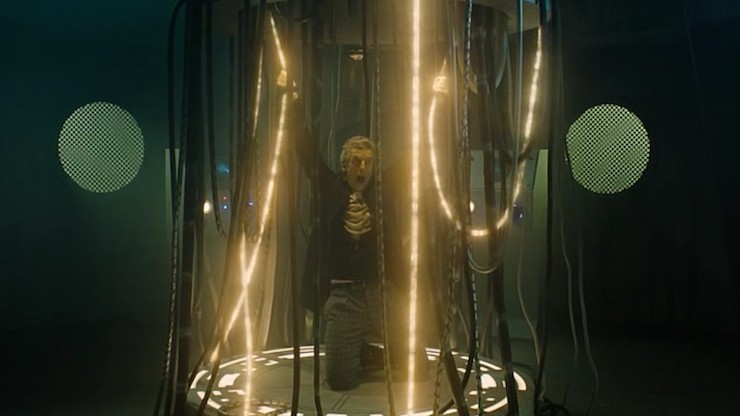
It was a trap. Davros begins to drain the Doctor dry, using the regeneration energy to invigorate the Daleks and prolong his life. Missy rushes to the chamber and destroys the cable system before the Doctor can be killed, and the Doctor claims that he always knew Davros was going to double-cross him. And the Doctor thought of something that Davros did not: the sewers. All the basically dead Daleks start sliming up from the sewers to attack the still-live ones, and the Doctor and Missy escape. When they reach Clara—who is stuck in the Dalek casing—Missy tells the Doctor that it is the Dalek who killed Clara (because Clara cannot say her name or anything kind at all). But Clara manages to ask for mercy, which gives the Doctor pause. The Doctor tells her to think the casing open, and when Clara is revealed, the Doctor tells Missy to run. Missy is eventually caught by the Daleks, and claims that she has an idea.
The Doctor and Clara go back to where the TARDIS was and the Doctor admits that it wasn’t destroyed, only dispersed. His sunglasses call it back together—he’s into wearable tech now. Once they’re away, he ponders over a peculiarity: If Clara were able to ask for mercy, it means that Daleks have a concept of mercy, and he can’t figure out how that could be true. It clicks suddenly, and he goes back to little Davros on the battlefield, using the Dalek tech to destroy the hand mines that had him trapped. The boy asks if he’s a friend or enemy, and the Doctor tells him that he doesn’t think sides matter much, only mercy. They walk off together.
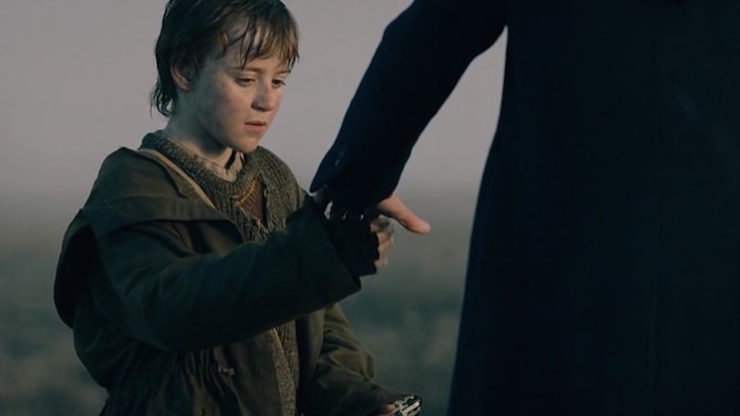
Commentary
I would like to point out that in Missy’s potential scenario at the start, the Doctor is running away from android assassins in Hogwarts. It’s definitely Hogwarts. So we now have confirmation that the Doctor has been to Hogwarts, where he thwarted a plot from evil android assassins to probably kill Harry. Or something.
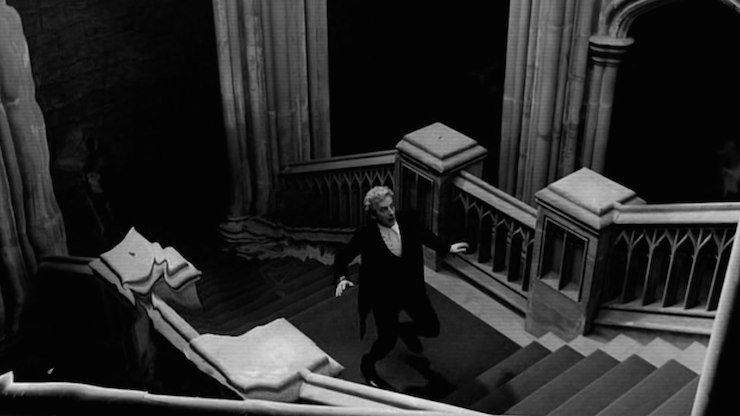
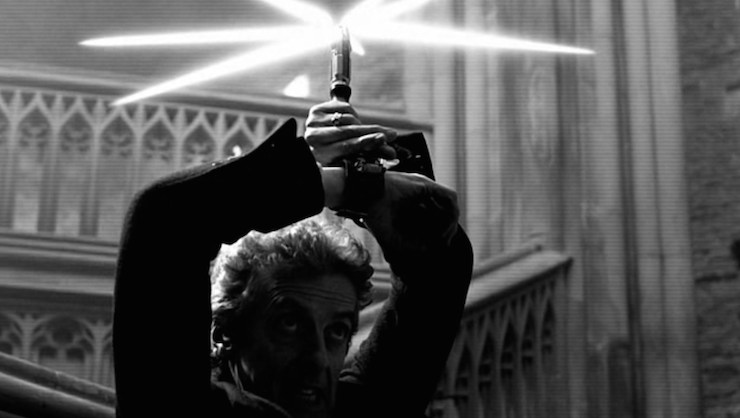
If there’s anything that this episode (and the two-parter as a whole) suffers from, it’s that there are one too many “gotcha!” double-backs, and not all of them are that smart. Sure, we know Davros is up to something, but the Doctor’s final insistence that he knew Davros would betray him this way from the start seems pretty hollow when you consider the price he’s likely to pay for that stunt. (YOU DON’T JUST GIVE AWAY REGENERATION POWER WILLY-NILLY LIKE THAT, WHAT IS WRONG WITH YOU.) We know the Daleks aren’t going to be gone, and we know that Davros will be back sometime. If the Doctor had really thought that the regeneration of the species would lead to their final demise, you could see why he’d be willing to go along with it, but it doesn’t seem that way at all—it just seems like he knew he could use it for a good exit, and now he’s gone and made them ridiculously powerful.
Those issues are unfortunate because they dampen what is otherwise a very strong episode. Davros offering the Doctor a way to commit genocide against the Daleks, which he refuses, is a harkening back to many previous encounters between them, most specifically “Genesis of the Daleks,” where the Fourth Doctor has that same chance and also refuses. The moments we get between Davros and the Doctor are powerful by and large: Davros understands much of the Doctor, and knows exactly which buttons to push; the fact that he asks the Doctor if he is a “good man”—something that the Doctor was asking himself in the previous season—proves that well enough.
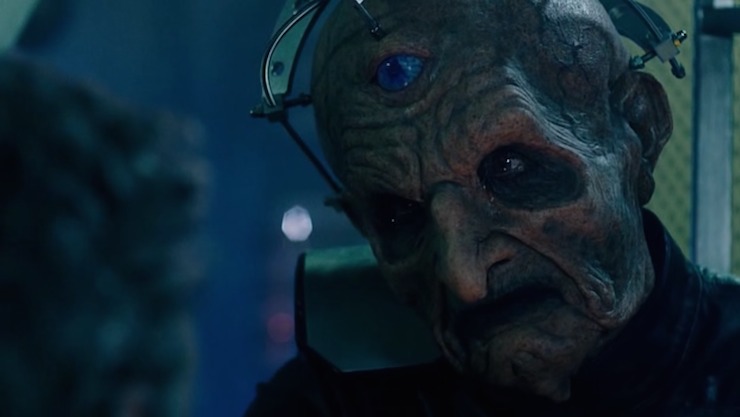
And then the Doctor essentially admits to what Davros had been calling his “greatest weakness”: He did not come to Skaro because he was ashamed of what he did to Davros as a boy, but because Davros is dying, and he asked for him. Compassion all over again, the mark of any good doctor. And while we know by the end that Davros is being tricky here, trying to forge these moments between him as a way of getting what he wants, you can’t help but suspect that there’s truth in these exchanges. That Davros maybe is glad that the Doctor has not lost the Time Lords, that he does wonder about his legacy in creating the Daleks, that there is a part of him that misses connecting with any being that is not one of his creations. That moment of laughter between them feels far from forced, and seeing Davros open his true eyes is a jarring and sincere move. (Props to Julian Bleach here, he does an incredible job.)
There are some interesting reveals here that I’m not quite sure I understand, most of them wrapped up in Clara’s time in the Dalek casing. So, when she tries to give her own answers to questions, when she says anything kind or caring, they are usurped by Dalek words of hate… but the Dalek itself isn’t in the casing. Does that mean that Daleks aren’t permitted to say that they truly think, that the technology in their casing overrides it? Or does it simply mean that, to a Dalek, even emotions like love become warped and are then channeled into violence? Because that segment was fascinating, but it wasn’t really given the explanation it deserved.
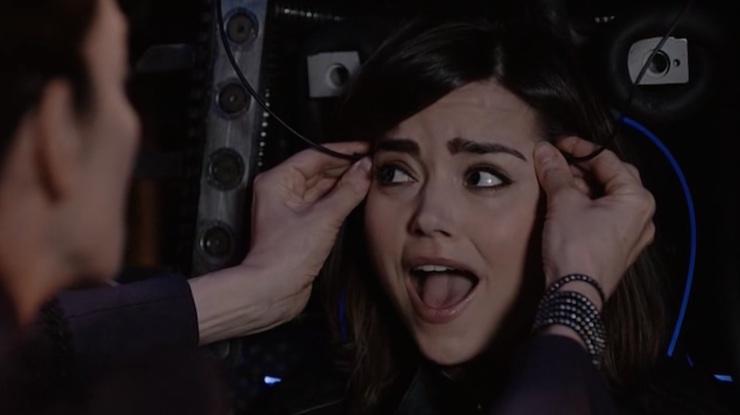
(Also, there was an extra layer of creepy here, considering that Clara-inside-a-Dalek is technically how the Doctor first met her.)
We find out that the Doctor’s will is not precisely a will, it’s a confession disc, one that presumably explains why he ran from Gallifrey all those years ago—is that this season’s long game mystery? Because… that’s actually pretty interesting question to me, resolved or not. It’s a much better question to be asking than “Doctor WHO?” any day of the week.
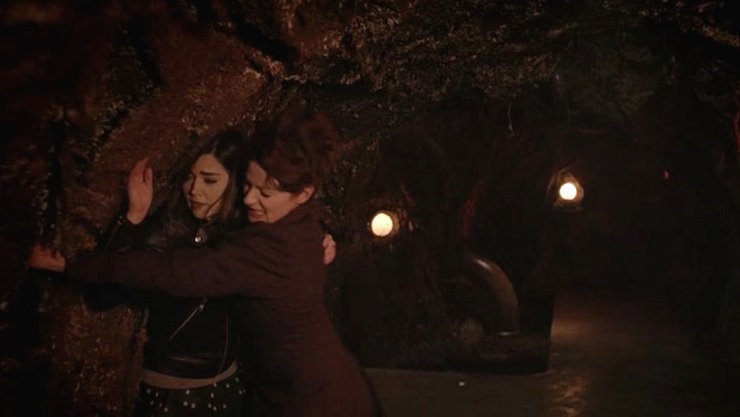
I’m already sorry that Missy is likely to go under the radar until the finale, as she and Clara made a hilariously fun team to watch, and it’s not quite so common to have two female companions around anymore. (We had some fun in the fourth season finale, and when Martha and Donna were both around for the Sontaran two-parter, but other than that, we haven’t had the dynamic since Nyssa and Tegan were on the TARDIS.) Plus, she’s the perfect dramatic instigator: Trying to get the Doctor to inadvertently kill Clara was a superbly evil move, and the comments she makes afterwards (about trying to get the Doctor to see the enemies in his friends, and the friends in his enemies) make it even more wrenching. Because the Doctor loves to talk about the Master as though they’re enemies—and in a way they are—but that also couldn’t be further from the truth. And this incarnation of the Master cares very much about making that distinction, about making her friend admit that he is her friend. Her parting shot proves it all over again: He tells her to run, and she tells him that he was always the one who ran, not her. So again, there are hurt feelings there, anger at being constantly left behind.
There’s the title to consider as well—”The Witch’s Familiar.” My immediate guess is that the witch is Missy, and Clara is her familiar? Since we know that the Missy considers herself the “original” companion after a fashion, and she did hand-pick Clara for the Doctor.
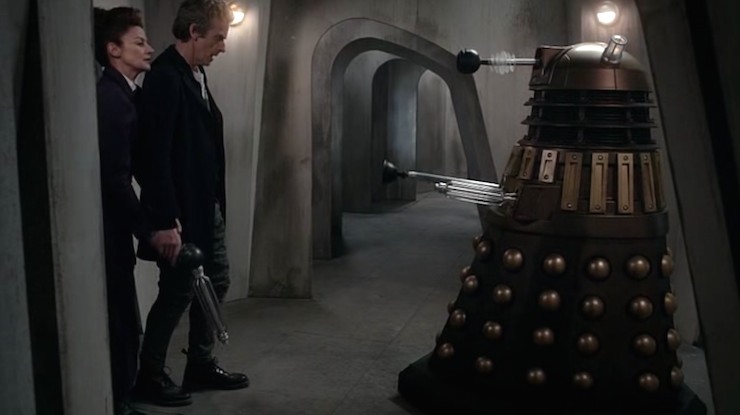
Also, Missy had a comment about her star alloy thingamajig, something that she claims the Doctor gave to her for her daughter… of course, she could be lying, but if she’s not, then they were both parents at some point, and now I’d be just as happy to watch a series of the Doctor and Master co-parenting Time Tots on Gallifrey. My needs are few, give me this one thing.
The overall theme of mercy being a necessity (and it being a key quality that the Doctor himself ultimately inscribed on the Daleks) only really grabbed me because we, as the audience, have seen a Dalek plead for mercy before—when the Doctor wasn’t around. That was in the season five finale, when a Dalek begged River Song. So the fact that this is something that we had experienced before as viewers when the Doctor had not made it even more interesting. It made his choice to influence young Davros there at the end feel less like a cheat. My only quibble is that it’s become something of a stock point in the show that the Doctor is totally responsible for the good in everyone, now up to and including his greatest enemies. So maybe that’s getting to be a bit much?
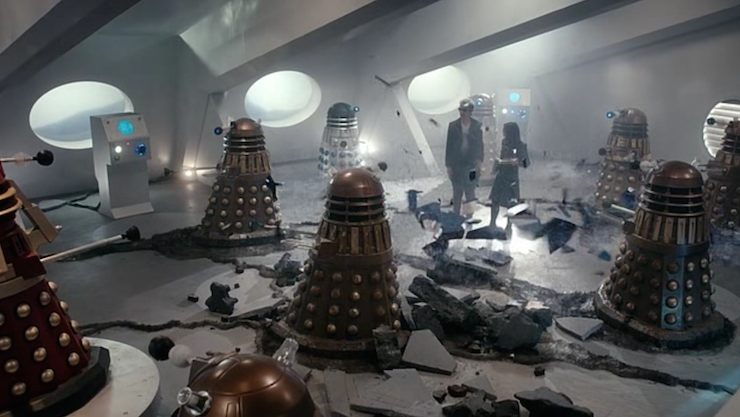
All in all, an emotional start to the season. Hopefully there is more of the same on offer down the road—minus a few confusing hiccups, this was a great ride.
Emmet Asher-Perrin thinks that maybe the Doctor should stop tossing around regeneration energy like it’s candy. You can bug her on Twitter and Tumblr, and read more of her work here and elsewhere.










